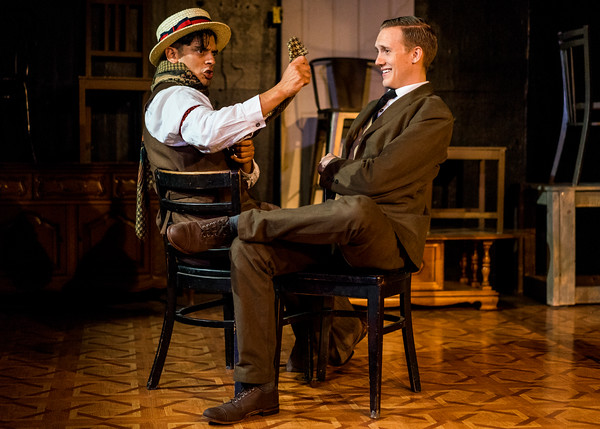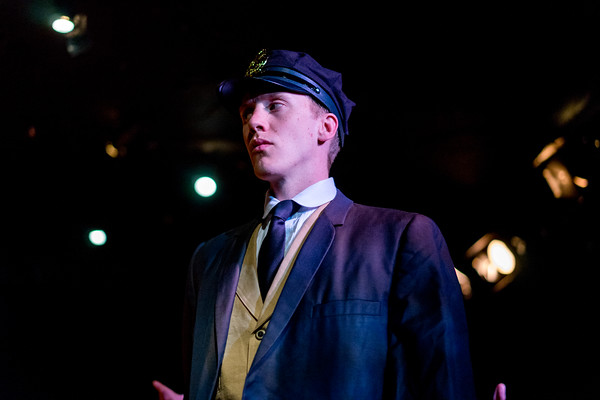Blurring the Line Between Theatre and History

Richard Johnson and Colton Iverson. (Photos courtesy of Daren Scott.)
Opening in Los Angeles, two actors, Brown (Colton Iverson) and Warren (Richard Johnson) are auditioning for a movie. As a way to keep themselves entertained, they “pretend” to cooperate with the police. In their possibly imaginary tale, the troupe members pose as gay men in different bathhouses and restrooms in the City of Angels. The duo agrees to seduce and entrap unsuspecting gentlemen.
Jacobson’s script starts out realistically enough with the thespians discussing the craft of acting. After they begin to portray different characters, ranging from police officers to foreigners, the plot turns into a psychologically complex narrative. In later sequences, it becomes increasingly difficult to figure out whether the wait for the audition is continuing, or if their fantasy is, in fact, a reality.
Iverson and Johnson take part in a balancing act by switching back and forth between multiple personas. The stars get under the audiences’ skin as the characters possibly descent into madness.
Each star has witty timing, in particular during their early interactions. Conversations about theatre and stage experience are enjoyably humorous.
Ion’s founder/executive artistic director, Claudio Raygoza, directs and designs the drama on the Elaine Lipinsky stage. He transforms an audition room into a mini Los Angeles where the space becomes a newspaper office, bar and prison in an instant.
His costumes, in particular, expand the scope of the story. Change of clothes allows the fictional artists to believably inhabit the numerous roles.
The Twentieth-Century Way makes a big statement about how excessive certain performers can be in order to stand out from the crowd. Brown and Warren are equally passionate about the stage, and a battle of wills grows between them. Whether the players are fighting for a part or for self satisfaction is not revealed until the very end.
Another reoccurring message involves the unfair treatment of gay men, in the not so distant past. It was a time when the so-called “criminal” was actually a victim. Theatregoers feel compassion for the arrested “degenerates,” because they are not a threat to others or society.

Colton Iverson.
Jacobson’s only line that is a little too preachy is one that Brown utters shortly before the conclusion. For a brief instant, the message about obsessive acting becomes too obvious.
Though the dialogue is temporarily heavy handed, the final moments are subtle. Viewers should pay close attention to the last exchanges to fully appreciate a subversive final twist. This is not really a spoiler, because many might not realize how smart Jacobson’s concluding exchange is, unless they have read the program beforehand.
Raygoza’s version is not the typical production one associates with the summer, which makes the night all the more satisfying. What results is an intelligent and absorbing think piece for mature viewers. Buy tickets before July 24.
[box] Show times are Sundays at 5:00 p.m. and 8:00 p.m., Wednesdays at 8:00 p.m., Thursdays at 8:00 p.m., Fridays at 8:00 p.m., and Saturdays at 6:00 p.m. and 9:00 p.m. [/box]

A fan of theatre from a young age, David Dixon began writing reviews while in middle school, for Union Tribune’s Rated G column and sdcnn.com. He was the Entertainment Editor for SDSU’s The Daily Aztec. Currently, he contributes to San Diego Community News Network, a regional reviewer for Talkin’ Broadway, an interviewer for San Diego Theatre Reviews and has won several San Diego Press Club Excellence in Journalism Awards. David is a San Diego Theatre Critics Circle member, an American Theatre Critics Association member & Regional Theatre Tony Award voter.


